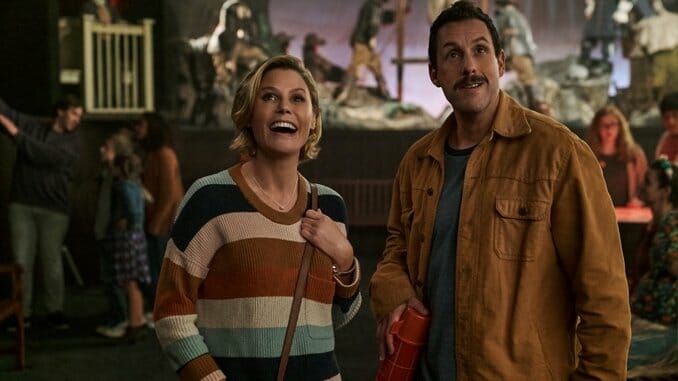Don’t Hate on Hubie Halloween: Adam Sandler’s Latest Is Totally Okay
Photos by Scott Yamano, courtesy of Netflix
Last week I drove to the Grand Canyon. On the way I watched Hubie Halloween. It’s fine, actually.
Hubie Halloween is the latest movie from the fruitful partnership between Netflix and Adam Sandler. Since 2016 the comedian has starred in six films for the streamer as part of an ongoing relationship that has brought his production company hundreds of millions of dollars. Netflix is clearly excited about the deal; Sandler’s movies are apparently among the most watched on the service, and earlier this year the company extended the original four-movie agreement to include four more Sandler originals.
Critics, largely, haven’t been nearly as enthusiastic. Not a single one of Sandler’s six Netflix films has a “fresh” rating on Rotten Tomatoes. The average score for these movies on the review aggregator is just under 26%. (This doesn’t count Noah Baumbach’s Netflix original The Meyerowitz Stories (New and Selected), which stars Sandler but was not produced by his production company and is not a part of its deal with Netflix.) Most tellingly, the brilliant minds at Paste Magazine haven’t added a single one of these movies to their list of the best comedies on Netflix.
I’ll be honest: I hadn’t seen any of these movies until watching Hubie Halloween last week. And I’m somebody who, at one time, was absolutely the target demo for Adam Sandler: I was in middle school when he started on Saturday Night Live, was in high school when he released his first comedy album and made the jump into movies, and continued to enjoy his movies into the 21st century, when many early fans started to lose interest in them. I eventually stopped watching the annual stream of Sandler films at some point in the mid ‘00s, outside of the occasional “serious” role, and by the time that original Netflix deal kicked off in 2016 I was thoroughly out of the Sandler loop.
Those early Netflix movies—The Ridiculous 6, The Do-Over, Sandy Wexler—looked every bit as lazy and indulgent as Sandler’s rep had become. All respect to somehow turning your work into a way to hang out with old friends, but stuff like Grown Ups and Blended were clearly more fun for Sandler and company to make than it was for anybody to actually watch. The Netflix deal seemed to move the bar even lower; now Sandler and his buddies could hang out in front of the cameras a few weeks a year and not even have to worry about the box office. Why fret about making a movie that’s actually good or funny even remotely competent at that point?
-

-

-

-

-

-

-

-

-

-

-

-

-

-

-

-

-

-

-

-

-

-

-

-

-

-

-

-

-

-

-

-

-

-

-

-

-

-

-

-









































